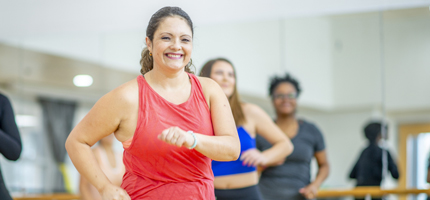Choose a class from one of the Wellbeats channels! Anything from yoga, Zumba, sculpting, step and more!

Here you can look up a healthcare provider, a clinic location, information about a condition/treatment, events, or other infromation.
Choose a class from one of the Wellbeats channels! Anything from yoga, Zumba, sculpting, step and more!

Sports medicine is a branch of medicine that deals with physical fitness and the treatment and prevention of injuries related to sports and exercise. Sports medicine is not just for professional athletes.
When you injure yourself during exercise or while playing a sport, you want to return to your routine and athletic pursuits as soon as possible. Sports medicine doctors have specialized training to help you do just that. They’re also experienced with preventing illness and injury in active kids, adults, and people with physically demanding jobs.
A physician often leads a sports medicine team. Most sports medicine doctors are board-certified in a specialty such as family medicine, orthopedics or pediatrics, and then they pursue additional training in sports medicine.
There are other non-physician medical professionals who are critical to delivering care in sports medicine. They include physical therapists, certified athletic trainers and nutritionists. They each play an essential role in your care:
Sports medicine doctors, physical therapists, certified athletic trainers and dieticians work together to help you get back to your physical activities as quickly as possible.
Being active and playing sports are so good for you physically and mentally. But there is an inherent risk of injury. Below are some of the common injuries we see in sports medicine:
After we treat your injury, we will also help you prevent future problems. We can also help you maximize your performance with the proper nutrition and exercises.
If you think you can benefit from seeing a member of our sports medicine team, please call us at 320.679.1313.
In today’s workforce, too many people are sitting at a desk all day long. When you reduce sedentary time, you can improve your physical, metabolic and mental health. So consider sitting less and standing more with a stand-up desk.
A standing desk is not going to help with weight loss or avoid weight gain. But there are benefits that researchers have identified:
Other potential health benefits have not been proven. Instead, they are assumed based on research that shows that long hours of sitting are linked to a higher risk of obesity, diabetes, cardiovascular disease, cancer (especially colon or breast cancer) and premature death. More research into the health benefits of standing desks must be conducted to confirm their real health impact.
Before you buy a standing desk, have realistic expectations of its benefits and ease into its use. Here are some suggestions:
A standing desk isn’t right for everyone. It depends on the type of work you do, your work style, and your personality. But it might benefit you. There’s no harm in trying a standing desk. Just follow the recommendations so you don’t end up with any “side effects” of this intervention.